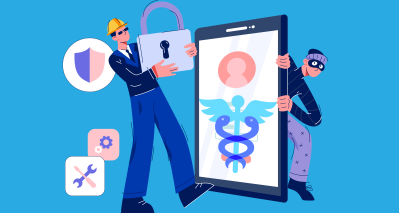Nowadays, the healthcare sector presents major technological advancements that intersect with the importance of privacy and security. More and more healthcare organizations are using digital platforms for enhanced patient care and operational efficiency, safeguarding sensitive information. This has become crucial in hospitals daily operations. Among the crucial regulatory frameworks governing data protection in healthcare, the Health Insurance Portability and Accountability Act (HIPAA law) .
What IS HIPPA?
HIPAA stands for Health Insurance Portability and Accountability Act. Passed in 1996 HIPAA is a federal law that sets a national standard to protect medical records and other personal health information. The rule defines "protected health information" as health information that:
1. Identifies an individual and
2. Is maintained or exchanged electronically or in hard copy. (Source)
However, being compliant with HIPAA is not only adherence to regulations; it requires continuous training and education.
Cyber threats are always present, posing significant challenges to healthcare cybersecurity. From ransomware attacks to data breaches, to malware injection the consequences of security lapses can be tremendous, compromising patient privacy and eroding trust. Therefore, healthcare professionals have to be vigilant and proactive in mitigating risks through robust cybersecurity measures. One of the foundational steps in this journey is ensuring HIPAA compliance, which entails implementing administrative, physical, and technical safeguards to prevent similar threats.
To navigate the complex landscape of cybersecurity and HIPAA compliance, healthcare professionals can benefit from specialized training programs tailored to their roles and responsibilities. Here are some recommended training initiatives:
HIPAA Compliance Training: Healthcare personnel have to attend regular HIPAA compliance training to understand the regulatory requirements, identify PHI, and comprehend their obligations in ensuring privacy for their patient and data protection. This training should cover HIPAA Privacy Rule, Security Rule, and Breach Notification Rule, emphasizing the importance of confidentiality, data integrity, and risk management.
Cybersecurity Awareness Training: Employees are often the first line against cyber threats. Cybersecurity awareness training equips healthcare staff with the knowledge and skills to recognize phishing attempts, malware, and other common attack vectors. By fostering a culture of security awareness, organizations can prepare employees to play an active role in protecting sensitive data.
Incident Response Training: Prompt and effective response to security incidents is essential for minimizing the impact of breaches. Incident response training prepares healthcare professionals to identify, contain, and mitigate security breaches in accordance with HIPAA requirements. Participants learn how to report incidents, coordinate response efforts, and communicate with stakeholders during crisis situations.
IT Security Training for IT Personnel: IT staff play a crucial role in maintaining the security of healthcare IT infrastructure. Specialized training programs for IT personnel cover topics such as network security, vulnerability management, encryption techniques, and secure configuration practices. By enhancing the technical expertise of IT professionals, organizations can improve their defenses against cyber attacks and be ready for potential threats.
Compliance Auditing and Monitoring Training: Regular auditing and monitoring are essential components to avoid any HIPAA violation. Training sessions focused on compliance auditing and monitoring educate healthcare professionals on conducting internal audits, assessing security controls, and identifying areas for improvement. Participants gain insights into best practices for maintaining compliance readiness and addressing audit findings effectively.
In conclusion, safeguarding patient data and ensuring HIPAA compliance require a multi-faceted approach encompassing cybersecurity awareness, regulatory knowledge, and technical proficiency. By investing in comprehensive training initiatives, healthcare organizations can empower their workforce to uphold the highest standards of data protection and mitigate the evolving threats posed by cyber adversaries. Together, through continuous education and proactive measures, healthcare professionals can fortify the resilience of the healthcare ecosystem against cyber risks.
#hipaa stands for #hipaa law #hipaa_violation #hipaa meaning #hipaa_privacy_rule










 Comment écrire une lettre pour demander/donner un conseil ?
Comment écrire une lettre pour demander/donner un conseil ?
 Comment écrire une lettre de demande
Comment écrire une lettre de demande
 Comment rédiger une lettre d'excuses
Comment rédiger une lettre d'excuses
 Comment rédiger une lettre de réclamation
Comment rédiger une lettre de réclamation
 Comment rédiger une lettre d'invitation
Comment rédiger une lettre d'invitation
 For Phd how to write a Letter of appology to a supervisor or an editor
For Phd how to write a Letter of appology to a supervisor or an editor
 Education traditionnelle VS enseignement à domicile, l'avenir de l'éducation
Education traditionnelle VS enseignement à domicile, l'avenir de l'éducation
 Certification en ligne gratuite plus accessible que jamais:
Certification en ligne gratuite plus accessible que jamais:
 Pourquoi l'école maternelle est-elle importante pour les enfants?
Pourquoi l'école maternelle est-elle importante pour les enfants?
 Rédaction de rapports de stage avec exemple : Format, plan et exemple de rapport de stage
Rédaction de rapports de stage avec exemple : Format, plan et exemple de rapport de stage
 Exemple d’attestation de prise en charge pour le besoin de visa en France tous les détails et explications :
Exemple d’attestation de prise en charge pour le besoin de visa en France tous les détails et explications :
 Documents et démarche pour l'obtention du visa long séjour étudiant France
Documents et démarche pour l'obtention du visa long séjour étudiant France
 Comment avoir un directeur de thèse en France
Comment avoir un directeur de thèse en France
 Bourse d'étude en France Eiffel financé entièrement licence, mastère, Doctorat: Appel à candidature annuel
Bourse d'étude en France Eiffel financé entièrement licence, mastère, Doctorat: Appel à candidature annuel